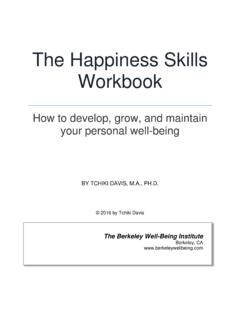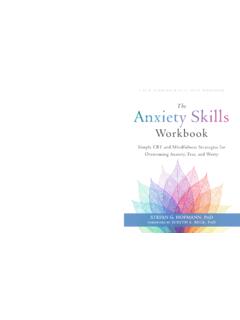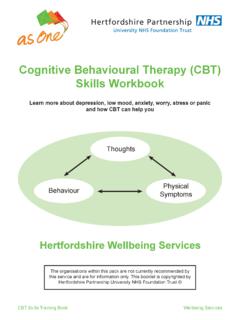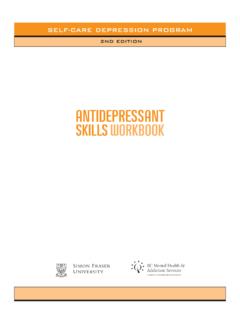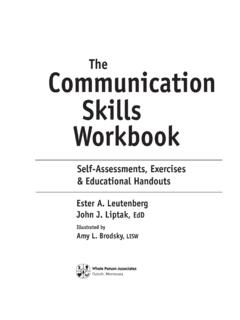Transcription of DBT Skills Workbook - Adoeci
1 The individual struggling with overwhelming emotions and DBT therapists will benefit significantly from this Workbook . McKay, Wood and Brantley have expanded and translated DBT Skills , making Linehan s iconic work on emotional skill building even more accessible and easy to apply to everyday life. Kate Northcott, MA, MFT, is a DBT therapist in private practice with Mindfulness Therapy Associates and is director of New Perspectives Center for Counseling, a non-profit counseling center, in San Francisco, CAThe Dialectical Behavior Therapy Skills WorkbookMATTHEW MCKAY, JEFFREY C. WOOD, BRANTLEY, MDPractical DBT Exercises for Learning Mindfulness, Interpersonal Effectiveness, Emotion Regulation & Distress ToleranceNew Harbinger Publications, s NoteThis publication is designed to provide accurate and authoritative information in regard to the subject matter covered.
2 It is sold with the understanding that the publisher is not engaged in rendering psychological, financial, legal, or other pro-fessional services. If expert assistance or counseling is needed, the services of a competent professional should be in Canada by Raincoast BooksCopyright 2007 by Matthew McKay, Jeffrey C. Wood, and Jeffrey BrantleyNew Harbinger Publications, Shattuck AvenueOakland, CA Rights Reserved Acquired by Catharine Sutker; Cover design by Amy Shoup; Edited by Elisabeth Beller; Text design by Tracy CarlsonLibrary of Congress Cataloging-in-Publication DataThe dialectical behavior therapy Skills Workbook : practical DBT exercises for learning mindfulness, interpersonal effectiveness, emotion regulation, and distress tolerance / Matthew McKay.
3 [et al.]. p. cm. ISBN-13: 978-1-57224-513- 6 ISBN-10: 1-57224-513-1 1. Dialectical behavior therapy--Problems, exercises, etc. I. McKay, Matthew. 2007 142--dc22 2007013007 In memory of my mother, Louise Long LaBrash, who was always there for me in the hard times. Matthew McKayTo my students and clients at Fresno City College and Reedley College, 2005 2006, whose strength, hope, and resilience inspired me while writing this book. Jeffrey C. WoodThis work is dedicated to all who struggle with intense and unpredictable emotions in their inner and outer lives. May you find peace and happiness, and may all living beings benefit from your efforts.
4 Jeffrey BrantleyContentsINTRODUCTION Dialectical Behavior Therapy: An Overview of the Treatment ..1 CHAPTER 1 Basic Distress Tolerance Skills ..5 CHAPTER 2 Advanced Distress Tolerance Skills : Improve the Moment ..31 CHAPTER 3 Basic Mindfulness Skills ..63 CHAPTER 4 Advanced Mindfulness Skills ..85 CHAPTER 5 Exploring Mindfulness Further ..115 CHAPTER 6 Basic Emotion Regulation Skills ..121 CHAPTER 7 Advanced Emotion Regulation Skills ..159 CHAPTER 8 Basic Interpersonal Effectiveness Skills ..181vi The Dialectical Behavior Therapy Skills WorkbookCHAPTER 9 Advanced Interpersonal Effectiveness Skills ..199 CHAPTER 10 Putting It All Together.
5 225 References ..229 INTRODUCTIOND ialectical Behavior Therapy: An Overview of the TreatmentDialectical behavior therapy, developed by Marsha Linehan (1993a, 1993b), is extraordinarily effective at helping people manage overwhelming emotions. Research shows that dialectical behavior therapy strengthens a person s ability to handle distress without losing control or acting lot of people struggle with overwhelming emotions. It s as if the knob is turned to maximum volume on much of what they feel. When they get angry or sad or scared, it shows up as a big, powerful wave that can sweep them off their you ve faced overwhelming emotions in your life, you know what we re talking about. There are days when your feelings hit you with the force of a tsunami.
6 And when that happens, it makes you understandably afraid to feel things because you don t want to get swept away by your emotions. The trouble is, the more you try to suppress or put a lid on your emotions, the more overwhelming they can get. We ll talk about that in chapters 6 and 7 on emotional regulation. What s important to know right now is that trying to stop your feelings doesn t s a fair amount of research to suggest that the likelihood of developing intense, over-whelming emotions may be hardwired from birth. But it can also be greatly affected by trauma or neglect during childhood. Trauma at critical points in our development can literally alter our brain structure in ways that make us more vulnerable to intense, negative emotions.
7 However, the fact that a propensity to intense emotions is often rooted in genetics or trauma doesn t mean the problem can t be overcome. Thousands of people have used the Skills you ll learn in this book to achieve better emotional control. They have changed their lives and you can what are these Skills , and how will they help you? Dialectical behavior therapy teaches four critically important Skills that can both reduce the size of emotional waves and help you keep your balance when those emotions overwhelm The Dialectical Behavior Therapy Skills Workbook1. Distress tolerance will help you cope better with painful events by building up your resiliency and giving you new ways to soften the effects of upsetting Mindfulness will help you experience more fully the present moment while focusing less on painful experiences from the past or frightening possibilities in the future.
8 Mindfulness will also give you tools to overcome habitual, negative judgments about yourself and Emotion regulation Skills help you to recognize more clearly what you feel and then to observe each emotion without getting overwhelmed by it. The goal is to modulate your feelings without behaving in reactive, destructive Interpersonal effectiveness gives you new tools to express your beliefs and needs, set limits, and negotiate solutions to problems all while protecting your relationships and treating others with book is structured to make learning easier. Each of the key Skills is covered in two chap-ters basic and advanced except mindfulness, which has a third, more advanced chapter. The basic Skills chapters teach necessary concepts, identify the components of the new skill, and lead you through initial steps for acquiring the skill.
9 The advanced Skills chapters take you through the remaining components of the skill, building level by level. There will be examples to make each step clear as well as assessments, exercises, and worksheets to help you practice each thing you learn. Then in the final chapter, Putting It All Together, you ll learn how to integrate all those Skills , in order to make them a regular part of your Dialectical Behavior Therapy Skills Workbook is written to make learning easy. The hard part will be making the commitment to do the exercises and put your new Skills into practice. Nothing will change by just reading. The words on these pages will have no impact on your life unless you implement behaviorally the new techniques and strategies you will learn here.
10 So now is a good time to think about why you are reading this book and what you want to change. Right here, on this page, write down three ways you currently react to your emotions that you want to change. In other words, what three things do you do when upset or overwhelmed that are damaging and that you are committed to replace with better ways to cope?1. 2. 3. Dialectical Behavior Therapy: An Overview of the Treatment 3 WHO THIS BOOK IS FORT here are two intended audiences for The Dialectical Behavior Therapy Skills Workbook . The first is people who are in dialectical behavior therapy (either group or individual) and need a Workbook to help learn the four key Skills .

